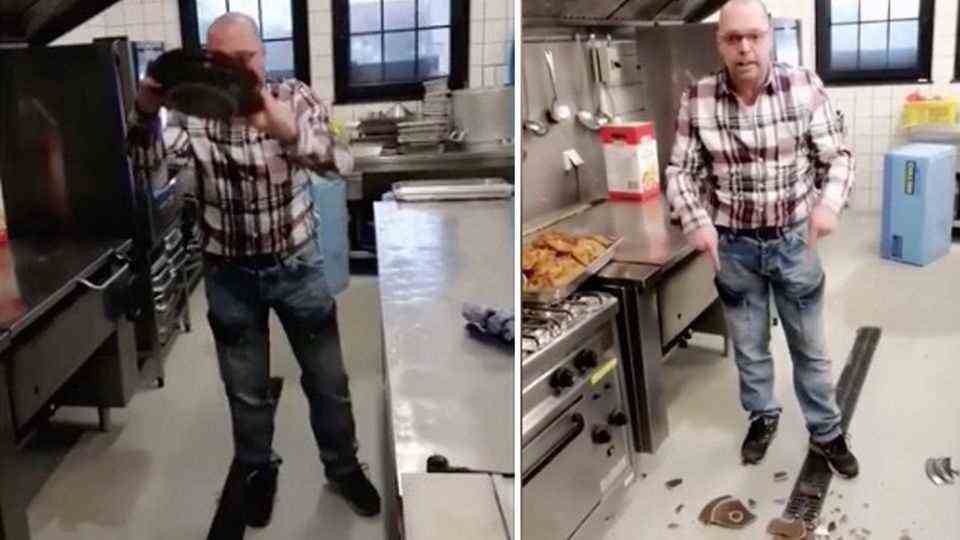interview
Hamburg restaurateur
In the first year of the corona, he almost had to close his restaurant, now it’s going better than ever
Gastronomy Patrick Rousseau in his Hamburg restaurant “Tagliere e Vino”
© private
A year ago restaurateur Patrick Rousseau was on the verge of bankruptcy, today he is doing amazingly well. Here he talks about lockdowns and 2G, rejected and approved aid payments – and all the good things that happened to his shop in 2021.
Mister Rousseau, in November 2020 we had a chat about your restaurant’s struggle for survival in lockdown (read the article here). Perseverance was the motto. Would you have thought back then that a year later we would be sitting in the middle of a corona wave again?
To be honest, I thought it was possible. If I have learned one thing in the Corona crisis, it is this: The only thing that is certain is that nothing is certain. Unfortunately, things have turned out differently than hoped and different than promised by politicians.
After all, your restaurant “Tagliere e vino” still exists. What is the current situation like? Normally now would be the time for Christmas dinner and cozy drinks.
I honestly have to admit: Compared to other restaurateurs, we’re doing very well at the moment. The guests are there. Last weekend the shop was full and sales were good. I can’t complain about that.
Despite the current pandemic situation, do people dare to go into the store?
Yes, that is also due to our clientele here in downtown Hamburg. Many guests come to us with a high level of education, which I think results in a high vaccination rate. So the switch to 2G didn’t affect us at all. What we feel is the obligation to work from home, because the midday business breaks down because the surrounding offices are empty. But it goes well in the evening: I think a lot of people are afraid of a new lockdown and want to get out again.
How did you get through the year financially? They could only sell outside the home for months. Nevertheless, you initially received nothing when it came to the federal government’s aid at the beginning of the second major lockdown a year ago.
We actually didn’t get the November and December 2020 aid because, as a young company, we fell through the grid with the calculation method. Fortunately, we received Bridging Aid III from January onwards. That saved us over the winter. In total, I had received around 95,000 euros in aid from the state by May, which of course was offset by expenses of the same amount. To this day, however, I do not know whether I will have to repay any of it and, if so, how much. Companies cannot yet make the final settlement for the bridging aid. My tax advisor jumps in a triangle. In any case, I am very happy that I am out of this whole state aid payment machine.
So it could have been worse?
The time when we could only offer food outside the home was very tough. But in the end we made a profit with the restaurant this year. This was mainly due to the strong summer months, which went very well for us. This enabled us to build up a financial cushion that will prepare us for a few bad months of sales or even a possible further lockdown. We survived two lockdowns, and if necessary, we can survive a third.
Not all restaurateurs can say that.
Yes, a lot of restaurateurs are struggling. Many have used up their reserves, and many also run out of energy. I also personally know people who have had to close down, and these are often companies that were already ailing before the crisis or whose concept is simply no longer up-to-date. Some also received little state aid, because they always had a lot of negative results and therefore could not produce any reasonable official figures. Some black sheep that had not managed correctly were also screened out, which will strengthen the industry in the long term.

When the restaurants were allowed to reopen after the lockdown this year, there was suddenly a shortage of staff everywhere because many had reoriented. How was that with you?
Since we always increased the short-time wages to 100 percent during the lockdown, we still had the team together and were able to get started again in the spring. We now have 21 employees and the team is as good as ever. My highlight was one of my service staff who actually wanted to change industries during the Corona period. After all, she decided on further training and has now risen to the position of plant manager with me. She’s running the business now and going into it, I’m extremely proud of her.
At the end of this second Corona year, does the positive really outweigh the positive for you?
Corona has already hit me hard economically because we lost a lot of sales at times. On the other hand, there have been opportunities to break new ground. For example, we will abolish cash for the New Year and only accept card payments and also ban paper menus and only offer them digitally. That is more hygienic and more sustainable. Some things can now be implemented because an awareness of them has arisen. In this respect, Corona is also a driver of innovation and it is important to take advantage of the opportunities that arise.


